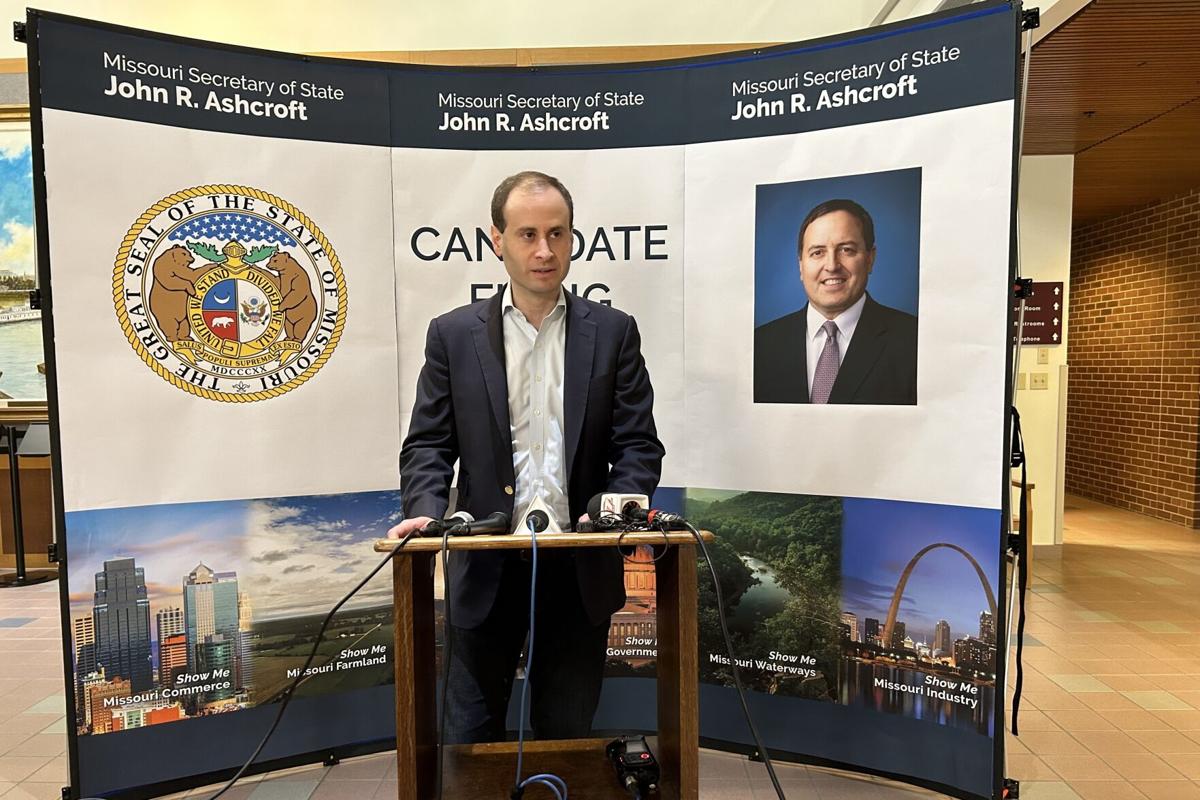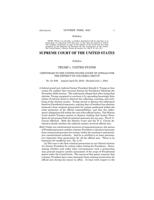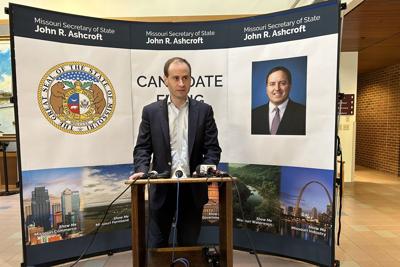A Republican candidate for Missouri attorney general played a major role in former President Donald Trump’s aggressive fight to shield himself from criminal prosecution, an effort that led to a U.S. Supreme Court decision on Monday that former presidents enjoy presumptive immunity from criminal prosecution for official acts taken in office.
The candidate, Will Scharf, and another Missouri lawyer, former Missouri Solicitor General D. John Sauer, were part of Trump’s legal team in the case. Both argued Trump should be shielded from prosecution as he faces a series of indictments, including federal charges over his role in trying to overturn his 2020 election loss and allegations he illegally retained classified documents after leaving office.
The Supreme Court in a 6-3 decision found that presidents enjoy absolute immunity for acts within their “conclusive and preclusive” constitutional authority and presumptive immunity for all official acts. Lower courts will now have to decide whether Trump was acting in his official capacity when he took steps to try to overturn the election — a process likely to take months, which all but guarantees he won’t face trial in the case until after the 2024 election, if at all.
People are also reading…
The opinion marked a success for Scharf, a former federal prosecutor who is challenging Missouri Attorney General Andrew Bailey, a Republican who has been in office since January 2023. The two Republicans have been locked in an increasingly bitter fight ahead of the August primary.
Both candidates are very conservative, and in the absence of major policy differences, the race has largely turned on their efforts to outmaneuver each other in demonstrating loyalty and fealty to Trump, the presumptive GOP nominee for president. As Scharf has been on Trump’s legal team, Bailey has filed numerous briefs supporting the former president.
Scharf, in a statement to The Star on Monday, touted the ruling as a “tremendous win for the Constitution” and for Trump.
“It has been an honor representing President Trump in this matter, and I am glad that the Court has recognized the deeply problematic constitutional aspects of Jack Smith’s rush to prosecute the President,” he said, referring to the special counsel for the Department of Justice.
While Sauer represented Trump during oral arguments, Scharf’s name along with others has appeared on Trump’s filings in the case. In addition to contributing to Trump’s legal briefs, which are a core element of any Supreme Court case, Scharf was also a regular defender of the former president on television.
For his part, Bailey in a social media post following the decision highlighted the brief he had filed on behalf of Trump.
“Proud of the work we’ve done in this case and so many others to combat the weaponization of government against President Trump,” Bailey wrote.
Trump — backed by Scharf and Sauer — argued that he was immune from prosecution for any official acts taken while in office, a position that potentially would shield him from the federal election interference case. The argument led to extraordinary hypotheticals. During oral arguments in April, Sauer suggested presidents could be immune from prosecution for ordering the assassination of political rivals.
The Supreme Court’s decision, written by Chief Justice John Roberts, found that the Constitution’s separation of powers “requires that a former President have some immunity from criminal prosecution for official acts during his tenure in office.”
Roberts’ majority opinion was joined by Justices Clarence Thomas, Samuel Alito, Neil Gorsuch, Brett Kavanaugh and Justice Amy Coney, with Barrett and Thomas filing concurring opinions. Justices Elena Kagan, Sonia Sotomayor and Ketanji Brown Jackson dissented.
“Today’s decision to grant former Presidents criminal immunity reshapes the institution of the Presidency. It makes a mockery of the principle, foundational to our Constitution and system of Government, that no man is above the law,” Sotomayor wrote in dissent.
Sotomayor raised some of the extraordinary hypotheticals that Sauer had discussed in her dissent.
“The President of the United States is the most powerful person in the country, and possibly the world. When he uses his official powers in any way, under the majority’s reasoning, he now will be insulated from criminal prosecution,” Sotomayor wrote. “Orders the Navy’s Seal Team 6 to assassinate a political rival? Immune. Organizes a military coup to hold onto power? Immune. Takes a bribe in exchange for a pardon? Immune. Immune, immune, immune.”
Trump’s attorneys have argued that he is being charged for official actions, characterizing much of his effort to overturn the election as “communicating” with various government officials about election fraud.
Roberts wrote that while the president is entitled to some immunity for official actions that fall outside of his constitutional authority, the court would not weigh in on whether that immunity is absolute at this stage of the case. Roberts warned of a chilling effect if the president is subject to criminal lawsuits based on his official actions.
“A President inclined to take one course of action based on the public interest may instead opt for another, apprehensive that criminal penalties may befall him upon his departure from office. And if a former President’s official acts are routinely subjected to scrutiny in criminal prosecutions, ‘the independence of the Executive Branch’ may be significantly undermined.”
More legal fights ahead
Roberts appeared to be setting up another battle at the Supreme Court — whether Trump’s actions attempting to overturn the results of the 2020 presidential election were official.
Still, Roberts previewed a potential ruling by the court on Trump’s actions. He concluded that Trump’s interactions with then acting U.S. Attorney General Jeff Rosen — including urging Rosen to send letters to several swing states about election fraud — are protected by presidential immunity.
He also concluded that Trump has at least “presumptive immunity” over his effort to convince former Vice President Mike Pence to reject the official results from several swing states and instead use slates of fake electors.
Roberts asked a lower court determine whether Trump’s efforts to convince lawmakers in several states to reject the outcome of their respective elections and appoint a slate of false electors fell within official or unofficial duty, as well as whether his speech outside the White House on Jan. 6, 2021, could be considered official or unofficial.
Special Counsel Jack Smith, who is prosecuting Trump, and an array of groups opposed immunity. Former Sen. John Danforth, a Missouri Republican, along with other former federal officials filed an amicus brief arguing presidents don’t have immunity for official acts that seek to overturn election results.
“Presidential immunity, under any label, should never be so broad as to embolden an outgoing President’s violations of federal criminal statutes as part of efforts that would prevent” what the U.S. Constitution requires, Danforth and others argued, which is “the vesting of the authority and functions of the Presidency in the next, lawfully-elected President.”
Despite a lack of evidence, Republicans have largely cast the criminal cases against Trump as a Democratic conspiracy, baselessly alleging coordination between the U.S. Department of Justice and prosecutors in New York. In May, a New York jury convicted Trump on 34 felony counts, finding he falsified business records to cover up hush money payments to a porn star.
“I think the American people overwhelmingly see what’s going on here and what’s going on is an attempt to take this election away from the ballot box and shoehorn it into courtrooms across America,” Scharf has previously said.
Missouri Attorney General candidates Will Scharf, Republican, and Elad Gross, Democrat, participated in the Federalist Society debate on Monday, June 24, 2024. Here they discuss the possibility of a lawsuit, filed by incumbent Attorney General Andrew Bailey, against New York for prosecuting former President Donald Trump. Bailey did not attend the debate. Video provided by the society; edited by Beth O'Malley
















